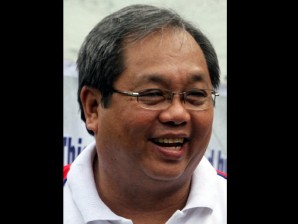
DILG Undersecretary Rico Puno. INQUIRER file photo/Niño Jesus Orbeta
Interior Undersecretary Rico Puno has quietly returned to his duties at the department after staying well out of the public eye for months in the aftermath of controversies, notably the Manila bus hostage crisis last year and his alleged links to jueteng operators.
Puno, a long-time friend of President Benigno Aquino, reported back to work on Tuesday after making a 10-day private visit to Australia, where he visited family members. In January, he accepted an invitation to New York City for a 14-day seminar.
But in between these out-of-the-country trips, little had been heard from the undersecretary for peace and order, fueling speculation in the media about his whereabouts.
Reached by phone in Tarlac, where he was attending a security-related event, Puno laughed off inquiries about his supposed disappearance, saying he was just quietly doing his job all this time.
“I’ve always been in the department, working quietly on matters that need not be announced to the media,” he told the Inquirer. He said his work involved a lot of intelligence gathering, which would explain his low profile.
Puno, however, promised to make himself more available to media, especially on security and police concerns.
The official “disappeared” from public view in the beginning of 2011 despite security problems that hit Metro Manila then, including a series of gruesome car theft-related murders and a bus bombing in Makati City that killed five persons and injured 13 others in the first quarter.
Department of Interior and Local Government public affairs officer-in-charge Feliciano Reguis earlier confirmed that Puno was back.
“I saw him in his office last Wednesday. I shook his hand,” Reguis said of Puno.
But it was Interior Secretary Jesse Robredo who first indicated Puno’s apparent return to the limelight, saying he had assigned Puno to investigate the allegations of favored treatment of influential inmates at the high-security prison at Camp Bagong Diwa in Taguig City.
Robredo, however, did not reply to inquiries later sent by text on Puno’s absence.
Puno, who Aquino said was assigned to handle police matters, found himself at the center of controversy in August 2010 following the hostage-taking incident that led to the deaths of eight Hong Kong tourists and the gunman, Rolando Mendoza, a dismissed policeman.
Puno, along with Robredo, was widely criticized for the Manila police’s mishandling of the crisis. But Malacañang only admonished the two officials with a warning that any wrong move could mean dismissal.
Then in September 2010, Puno was named as one of the two “ultimate recipients” of payola from jueteng operators, allegedly getting up to P8 million a month, based on a list Archbishop Emeritus Oscar Cruz submitted to the three Senate committees jointly investigating the illegal numbers game.
Puno denied the charge, saying jueteng operators had only used his family and friends as emissaries to talk to him about continuing jueteng operations from Northern Luzon to Southern Tagalog. He refused to name the emissaries.